The Spanish Reconquest and the Battle of Covadonga: When myths contaminate history
In several recent essays historians discuss the founding milestones of Spanish nationalism, the traditional banner of conservative politicians, around the struggle for Al-Andalus
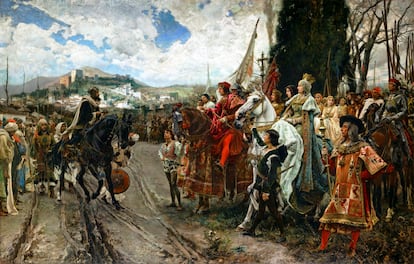
Tariq ibn Ziyad, in command of the troops of the Umayyad Caliphate of Damascus, arrived on the shores of Hispania in 711. The Visigothic kingdom was divided and, after a resounding victory against the forces of King Rodrigo in the battle of Guadalete (of disputed location), they advanced in just a decade through almost the entire Iberian Peninsula. Despite the scarcity of contemporary historical sources and aside from some conspiracy theories (such as that the conqueror would be Visigoth and called Taric), the invasion was consummated at that time and the experts agree on those facts: it is History.
Around 718 or 722, the battle of Covadonga supposedly took place in modern-day Asturias in northern Spain. It was a fray in which the legendary Pelagius the Visigoth, considered the first monarch of the kingdom of Asturias, halted the Muslim advance on the Cantabrian coast. It is recounted by the chroniclers of King Alfonso III a century and a half later and, regarding this event, many historians are in no doubt: it is a myth. Almost 800 years later, in 1492, Muhammad XII, known to the Christians as Boabdil the Younger, handed over the city of Granada (which was founded by the Muslims) to the Spanish Catholic Monarchs. In this, too, the experts concur: it is History.
The capture of Granada brought an end to eight centuries of Muslim domination in Al-Andalus (the Iberian Peninsula), a medieval period that has come to be known as the Reconquest: “How can something that lasts eight centuries be called a reconquest?” noted José Ortega y Gasset with irony in his essay España invertebrada (1921). And, here, many experts qualify the word as a term that — rather than defining a historical period — deploys a suitable narrative to consolidate Spanish nationalism: that is Ideology.
In recent months, several essays have been published that warn of the ideological contamination that has permeated Spanish historiography, books that point directly against several milestones of nationalism. “When historians become vindicators of the national spirit, their role is limited to that of indoctrinators of patriots at the service of political power,” warns medievalist and al-Andalus expert Eduardo Manzano Moreno in his book España diversa. Claves de una historia plural, a volume in which he denounces how the history of Spain has buried under a mountain of commonplaces an extraordinary past characterized by “a variegated and fascinating mosaic of diversity.” And the problem with this canonical account of history is its sectarian and non-inclusive nature, whose long shadow is cast over “Muslims, Jews, gypsies, pre-Columbian populations, heretics, political dissidents, and rival nationalist ideas and people.”
Untangling this mountain of identity clichés requires a great historiographical effort. The Royal Spanish Academy (RAE) defines in a second entry — incorporated into the dictionary in 1936 — the meaning of a term that has historians at odds. Reconquest: 1. “Action and effect of reconquering.” 2. “Antonomasia. Recovery of the Hispanic territory invaded by the Muslims in 711 A.D., which ends with the capture of Granada in 1492.″ But, if the verb reconquer is, also according to the RAE, “to conquer a place, province or kingdom that had been lost,” can you reconquer something that you never possessed, that was never in your power? Can the term be applied to the medieval peninsular period?
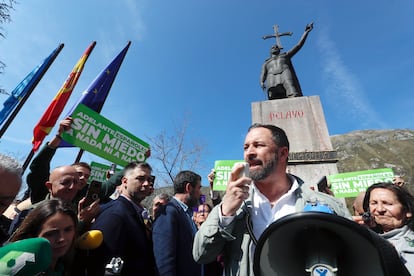
This is the debate that the book ¡Reconquista! ¿Reconquista? Reconquista with a rather eloquent cover drawing that features a medieval character swallowing, or perhaps spitting out, a huge toad, brings together. The fashioning of the title indicates the differing positions existing among historians: to retain the term to define that historical period given its implementation, to use it only in a restrictive way, or to do away with it altogether, to eradicate it from the vocabulary of historians and society. On the other hand, Covadonga, la batalla que nunca fue, by José Luis Corral, even denies the very existence of that confrontation, another banner of the Spanish right wing. And two recently published titles, Al-Andalus, by Maribel Fierro, and Pequeña historia mítica de España, by David Hernández de la Fuente, provide other approaches to the same dilemmas.
Under the coordination and editing of the historian David Porrinas, a medievalist and professor at the University of Extremadura, eight experts address in a collective essay the origins and semantic and historical connotations of the Reconquest, a concept that poses the controversial idea that Spain was forged against Islam. That is, while other invading civilizations such as the Phoenicians, Romans, or Visigoths are “us,” the inhabitants of al-Andalus, no matter for how many centuries they were rooted in the Peninsula, will always be “them.”
Professors Abilio Barbero and Marcelo Vigil, pioneers in the debate on the term Reconquest, had already questioned the concept — as recognized in the book coordinated by Porrinas — in three articles published between 1965 and 1971: for them, the Asturians, Cantabrians and Basques — the essence of Spanishness according to the defenders of the existence of an ancestral Spain — had remained outside the Roman and Visigothic domination and their subsequent struggle against the Muslims was only the continuation of the struggle against those peoples. They had nothing to reconquer.
Real, because of its consequences
Armando Besga Marroquín, of the University of Deusto in Bilbao, unequivocally applauds the use of the term in the essay. He affirms that, far from undermining its meaning, the Reconquest’s eight-century duration “explains its enormous legacy.” He notes that the concept was already used in that sense — although with other words — before its implementation in the 19th century; and, most importantly, he reduces the question to an all or nothing: if Spain existed before 711, there is Reconquest, and if did not, there is no Reconquest. For him, Spain did exist (which he identifies with Roman Hispania). And he recalls the Thomas theorem (formulated in 1928 by the sociologist William I. Thomas): “If people define situations as real, these are real in their consequences.” In his view, the consequences are that in the Iberian Peninsula there is now a Western society that differs from the one that might have existed in the absence of the invasion and the subsequent Reconquest.
Along these lines, Carlos de Ayala Martínez, of the Autonomous University of Madrid, argues that throughout those centuries there were periods in which a spirit of “legitimate recovery” of the Iberian Peninsula was established. Specifically, he notes that shortly before the year 900, in the time of Alfonso III, an ideology was forged and sustained by Pelagius, which supported the monarch as the supposed heir of the Visigothic kingdom to invade Al-Andalus with religion as a clear banner. This is where De Ayala establishes the beginning of the notion of Reconquest (but not the word). A story that would be repeated under different approaches in later centuries. Although, as he assures, Christians and Muslims did not spend 800 years in permanent struggle. They were centuries and centuries with periods of relative tranquility interrupted by countless clashes between the forces of both religions, but also of “Christians against Christians, Muslims against Muslims, or one and the other in coalition against alliances that included their own co-religionists.”
The forging of the nation-state in the 19th century
Martín Ríos Saloma, of the National Autonomous University of Mexico (UNAM), traces the origin of the historiographical concept of the Reconquest. After verifying that the political and military program of expanding the Christian territories at the expense of Al-Andalus did not incorporate the concept in the first centuries of the Reconquest, he explains that “its genesis and development is linked to the forging of the nation-state in the 19th century,” to the stories with which it was intended to “create a particular identity for the Spanish nation.”
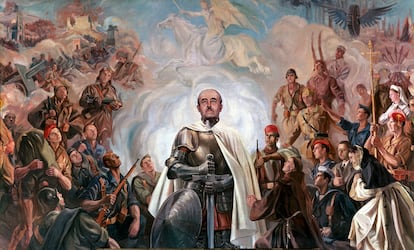
Specifically, in the 1840s, “the word Reconquest began to appear timidly” in several texts by historians, in a context that compared the conquest of Al-Andalus with the expulsion of the Napoleonic armies by guerrillas. And although at the beginning of the 20th century a movement arose against the term due to its ideological contamination, the Spanish Civil War and Franco’s regime put a stop to any debate. The word Reconquest was now used without hesitation in history texts, political slogans, and even sermons in pulpits. This has led to an “invented tradition,” as Ríos Saloma notes, mentioning the famous words of former Spanish prime minister José María Aznar in 2004 in Georgetown (United States): “Spain refused to be just another piece of the Islamic world,” he stated unashamedly, molding the concept of Spain as he wished.
De-ideologizing the word
Against the term, and the theses of Besga Marroquín and De Ayala, is Ana Isabel Carrasco Manchado, of the Complutense University, who states: “For it to be used as a useful historiographical category it would be necessary [...] to denationalize the concept, that is, to strip it of its ideological components of national identity.” Carrasco Manchado also believes that continuing to use the term in a pedagogical sense with the meaning of ideology justifying the war is more voluntarist than real. Therefore, she recommends dispensing with the use of a word that teaches nothing about the medieval society of those years and using already established concepts that describe the era much better, such as “feudalism,” “frontier,” “warlords,” or even “colonization” and “conquest.”
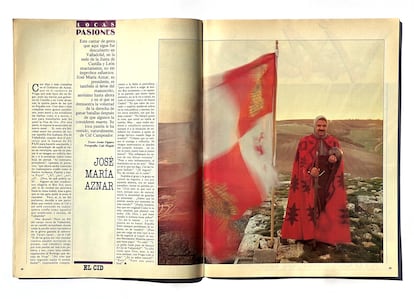
Along the same lines, Alejandro García San Juan, professor at the University of Huelva and signatory, together with Carrasco Manchado, of an initiative to eliminate the aforementioned second meaning put forward by the RAE, believes that speaking of the political uses of the Reconquest is “a mere redundancy” given that this is its essential function. In his text, the expert points out Spanish politician Manuel Fraga mentioning the “expulsion of the Moors” or King Juan Carlos I speaking of Covadonga as the place where the heart of Spain has “its most intimate and universal beat.” He recalls how Aznar, in 1987, when he was regional premier of Castilla y León, did not hesitate to dress up as El Cid for a report in El País Semanal and the leader of Spanish far-right party Vox, Santiago Abascal, at an event in Rome in 2019 went so far as to state: “Spain has an advantage: that it was vaccinated against Islamic immigration during eight centuries of occupation and eight centuries of Reconquest.” There is no doubt that, for the ultra-right leader, 800 years and 40 generations born in the Peninsula do not fit into his notion of “Spanish.”
From Franco the scriptwriter to Captain Trueno
Other experts who contribute to the essay are Francisco García Fitz, from the University of Extremadura, who does not hesitate to qualify the political uses of the concept as “a heavy burden for historiographic work.” Javier Albarrán, from the Autonomous University of Madrid, approaches the subject from the point of view of the Arab sources, who considered Al-Andalus their homeland after eight centuries of settlement (compared to the three centuries the Visigoths had been present in Spain), even after their departure in 1492. Francisco J. Moreno Martín, also of the Complutense, analyzes the incorporation of the word Reconquest into popular culture, ranging from the abundant representation of the milestones in painting and sculpture, and its use by Franco’s propaganda machine to equate the regime with the medieval past, to its use in literature, films such as Raza (scripted by Franco himself) that alluded to the great liberating crusade, and even comics such as El capitán Trueno or El guerrero del antifaz (The masked warrior).
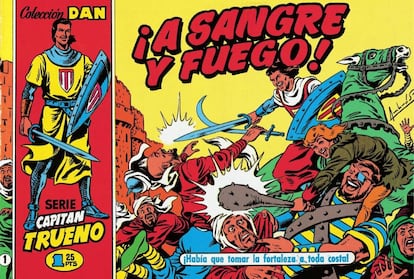
Rethinking concepts
José Luis Corral’s book, despite its title (Covadonga. The battle that never was), far from focusing on that mythical episode, becomes another challenge to the whole nationalist use of that medieval period. Corral, a professor at the University of Zaragoza, raises the difficulty of unraveling the historical facts of the rapid occupation — although everything points to a peaceful conquest, with only three notable battles, and achieved on the basis of pacts with the Visigoths. It is not surprising that, despite this, the Arab chronicles spoke of heroic victories while the Christian texts emphasized the violence and extreme cruelty of their enemies. As for Covadonga, it does not even give much credence to the Arab sources that mention, eight centuries later, the resistance of Belai al-Rumi (the mythical Pelagius), “a wild ass” who confronted them in the mountains and whom they ignored when there were only 30 “wild asses” left because, well, what harm could they do?
“Terms and concepts have a history behind them and therefore it may be necessary to abandon them or rethink them when the burden they carry does not allow an adequate understanding of the realities to which they are intended to refer,” explains Maribel Fierro, a researcher at the Center for Human and Social Sciences in Al-Andalus. In her book, as well as highlighting in several chapters the advances of that Iberian kingdom in science, culture, philosophy, art, politics and economics, Fierro underlines the respect that prevailed towards the other two monotheistic religions under the concept of dhimma — “there is no coercion in religion” states the Quran — in an application that implied no persecution, although discrimination did occur. Forced conversions were exceptional (contrary to the later policy of Castile in 1502 and Aragon in 1526). And the author explains that very few of the invaders were, from the ethnic point of view, Arabs and Berbers, so most of those who inhabited the peninsula were descendants of the native settlers, despite the current nationalist purpose of painting them as usurper foreigners. The expert also tries to clear up many of the confusing data of those years, such as the tendency to unify all the settlers of Al-Andalus under one prism, as they were all Arabized and Islamized to a greater or lesser degree and grouped under very confusing terms: Mozarabs, Muladis, Mudejars, Moors... And although interbreeding undoubtedly occurred, even among the ruling aristocracy, none of those lineages claimed their pre-Islamic peninsular past, unlike the Muslims in Persia, who did highlight their interbreeding to justify a lawful stay in a conquered land. This should not justify contemporary ideological rejection: “I have never heard a Muslim say sorry for having conquered Spain and occupying it for eight centuries,” said Aznar, on another visit to Georgetown in 2006.

A repeated pattern
For his part, the essay by David Hernández de la Fuente, professor at the Complutense University of Madrid, on the mythical history of Spain, addresses the controversy that divides historians. Starting with Pelagius, to whom all sorts of origins and lineages have been attributed, and his supposed tomb in Covadonga “as a symbol of the Christian restoration that came to save the embers of an ancient and romantic idea of Spain.” The story of the continuity between the Visigothic world and the Asturian or Castilian world follows, in the expert’s opinion, the same scheme as other European nations, which cling to “a sometimes tenuous and subtle thread” to speak “of the ups and downs of history, between heroes and traitors in a narrative pattern very much repeated in different latitudes.”
In another chapter he explains that Al-Andalus is torn between two archetypes: on the one hand, that of the utopia of an era of coexistence between religions and of an Arab Islamic culture, heir to Greek science and philosophy (as opposed to the “barbaric West”), and on the other, that of the denial of that entire period as part of the history of the homeland, considered rather as an “exception,” or “a parenthesis between the Roman and Visigothic eras and the neo-Gothic restoration of 11th-century Castile.” For all these reasons, Hernández de la Fuente recommends continuing research on the Islamic heritage in order to consolidate impartial studies that transmit a balanced vision far removed from ideologies.
But it may be difficult to move away from a mythology that survives to this day. It is worth recalling the significant electoral visits made in recent years by Vox leader Abascal to the monastery of Covadonga to immerse himself in Spanishness. There he proclaimed in 2019: “Asturias is Spain and the rest, conquered land.” Although perhaps in a slip of the tongue he forgot to say “reconquered,” a verb more in line with the ideology he propagates.
Sign up for our weekly newsletter to get more English-language news coverage from EL PAÍS USA Edition
Tu suscripción se está usando en otro dispositivo
¿Quieres añadir otro usuario a tu suscripción?
Si continúas leyendo en este dispositivo, no se podrá leer en el otro.
FlechaTu suscripción se está usando en otro dispositivo y solo puedes acceder a EL PAÍS desde un dispositivo a la vez.
Si quieres compartir tu cuenta, cambia tu suscripción a la modalidad Premium, así podrás añadir otro usuario. Cada uno accederá con su propia cuenta de email, lo que os permitirá personalizar vuestra experiencia en EL PAÍS.
¿Tienes una suscripción de empresa? Accede aquí para contratar más cuentas.
En el caso de no saber quién está usando tu cuenta, te recomendamos cambiar tu contraseña aquí.
Si decides continuar compartiendo tu cuenta, este mensaje se mostrará en tu dispositivo y en el de la otra persona que está usando tu cuenta de forma indefinida, afectando a tu experiencia de lectura. Puedes consultar aquí los términos y condiciones de la suscripción digital.








































